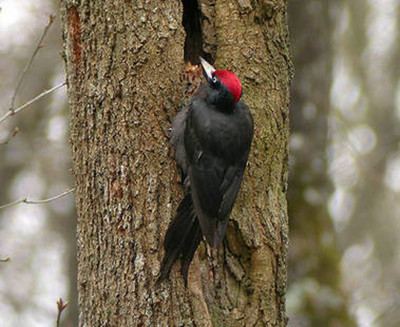Woodpeckers puncture the bark of dead or dying trees,also known as snags, to find the wood-boring insects that makeup their diet, and some species also excavate cavities in thesetrees for their nests.
啄木鳥啄破死樹或垂死的樹的樹皮,覓得吃木頭的昆蟲為食。有些物種也會(huì)在這些樹上筑巢。
So where does the fungus come in?
那么真菌是從哪來的呢?
Well, scientists observed that the snags woodpeckersexcavate generally contain decayed wood, which is caused by wood-decay fungi.
恩,科學(xué)家們觀察到啄木鳥啄洞的斷枝通常包含由木腐菌造成的蛀木。
Right. And thisled them to wonder whether woodpeckers are attracted to certain types of decay, or if they'rethe ones actually spreading the fungus that causes the decay.
是的。而且這引起觀察家們思考:是某些類型的腐爛吸引了啄木鳥,還是說啄木鳥實(shí)際上傳播了引起腐爛的真菌呢?
So what did come first?
那么到底哪個(gè)在先?

Well, it turns out that the relationship between the two is pretty complex.
恩,事實(shí)證明兩者關(guān)系相當(dāng)復(fù)雜。
When woodpeckers puncture bark, they provide a way for airborne fungal spores to infect the wood.
當(dāng)啄木鳥啄樹皮時(shí),它們?yōu)榭諝鈧鞑サ恼婢咦痈腥緲淠咎峁┝朔奖悖?/div>
They also act as vectors, unintentionally picking up fungal spores and other microbes from onesnag and carrying them in their beaks to another.
它們同時(shí)也是帶菌者,無意中攜帶了真菌孢子和來自某根斷枝的其他細(xì)菌,它們的喙載著這些細(xì)菌再傳播給其他樹木。
And not surprisingly, species of woodpeckersthat nest in cavities carry a significantly larger number of these, which is synergistic, because the decay makes it easier for them to excavate.
毫不奇怪的是,那些在樹洞里筑巢的啄木鳥攜帶著更大量的真菌,它們是協(xié)同作用著的,因?yàn)楦癄€使得啄木鳥啄洞更容易了。
So even though we still don't know which came first, this also isn't merely an intellectual exercise.
因此,即使我們不知道先有哪個(gè),這也不僅僅是一種智力測(cè)驗(yàn)。
Woodpeckers are pretty important ecologically because the sites they excavate are used forforaging, roosting, and nesting by many other species as well.
從生態(tài)學(xué)的觀點(diǎn)看,啄木鳥的角色相當(dāng)重要,因?yàn)樽哪绝B挖掘的樹洞可以用于覓食,棲息,還可以被其他物種用來筑巢。
And now that there's debate overwhether snags contribute to forest fires and should be removed, it's especially important to studypotential ramifications.
既然人們關(guān)于斷枝是否會(huì)導(dǎo)致森林火災(zāi)而應(yīng)該被移除爭(zhēng)論不休,那么研究一下可能出現(xiàn)的后果就特別重要了。












